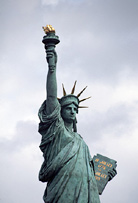
IS AMERICA READY FOR GENTLENESS?
Julie Redstone |
Ezinearticles.com, October, 2007 |
|
We have, in this country, an understanding of the power of force, the power of weaponry and of technology, the power of threat, the power of manipulation, but little if any understanding of the power of gentleness. Force, weapons, threat, and manipulation all involve aggression - the utilization of the assertive, masculine side of the human psyche - not just the psyche of men, but the psyche of all souls in their embodied expression. The impulse to act, to assert, to move forward, to take charge, is part of this masculine aspect, an aspect which only becomes problematic when it is not sufficiently balanced by the feminine side - by the desire to unify, blend, harmonize, and seek cooperation. Assertiveness and aggression are what marks governmental policy in certain eras, and also to a significant degree, defines the ways in which the public evaluates candidates for public office. Though little spoken of, the reliance of trust in public figures, despite America's desire for peace, is often trust in their capacity to make war, their capacity to be aggressive, their capacity to exercise their will, which, according to some interpretations, would be equal to the capacity to protect the nation from harm. Along with this stance go certain body characteristics that in today's consciousness convey to the public the same impression of power and strength - square or broad shoulders, a firm jaw, a neck that is broad, but not too broad, proportional rather than elongated. These convey an overall impression of sturdiness.. Slim or narrow shoulders, an elongated neck, a small head, a soft, pointed chin rather than a square jaw - these are the characteristics associated with gentleness, with the capacity to be wrong, with softness, which in some interpretations is equivalent to weakness. America desires peace, but is unwilling to seek that quality of peace and gentleness in her leaders. She fears aggression from without, and therefore seeks leadership that can embody a counter-aggression force in the face of potential threat. Beneath this preference is the belief that only might can sustain us, and that it is necessary to remain in the position of global dominance in order to insure safety. If one were to take away commitment to this premise, however, if one were to no longer accept it as valid, where would that leave us? It might leave us understanding to a greater degree both the value of cooperation and the value of gentleness - a quality that does not lack firmness and whose strength is inner, rather than outer.. It might lead us to understand how to value our uniqueness and the spiritual truths which lie at the foundation of this nation' and are part of her heart. It might steer us away from associating America's identity with power, while leading us toward compassion in relation to the world community.. Beneath the external overlay of power and aggression, America's heart remains wedded to the principles that are part of her founding. If one were to take away the need for dominance, there would still remain the capacity for leadership, but such leadership would be a moral leadership, based on the fundamental and universal premises, applicable to all peoples, of man's right to live freely upon the earth. There would also be the possibility for those to hold public office who represented not the capacity for dominance and assertion, but the capacity for negotiation and cooperation. Such is the time that we are moving toward, for it is essential that all nations come together with a sense of the uniqueness of each and the equality of all, not just as a concept, but as a living, breathing economic, political, and social reality. Within this human family, America would no longer play the role of 'superpower' or overlord, but would finally have the opportunity to express her true potential as a catalyst for change and as a champion for the improvement of the human condition. Her allegiance to the principles of light and truth would be held as a powerful illustration of what is possible when the welfare of all, and justice for all, are the cornerstones of a nation's identity. |
| Article Section - Worldwatch |
|
::
Home - Bookshop - Copyright - Updates - About Light Omega - Contact - Index
For an overview of the website, consult the Site Index, above. For more about the purification of America see Light America Spirit |